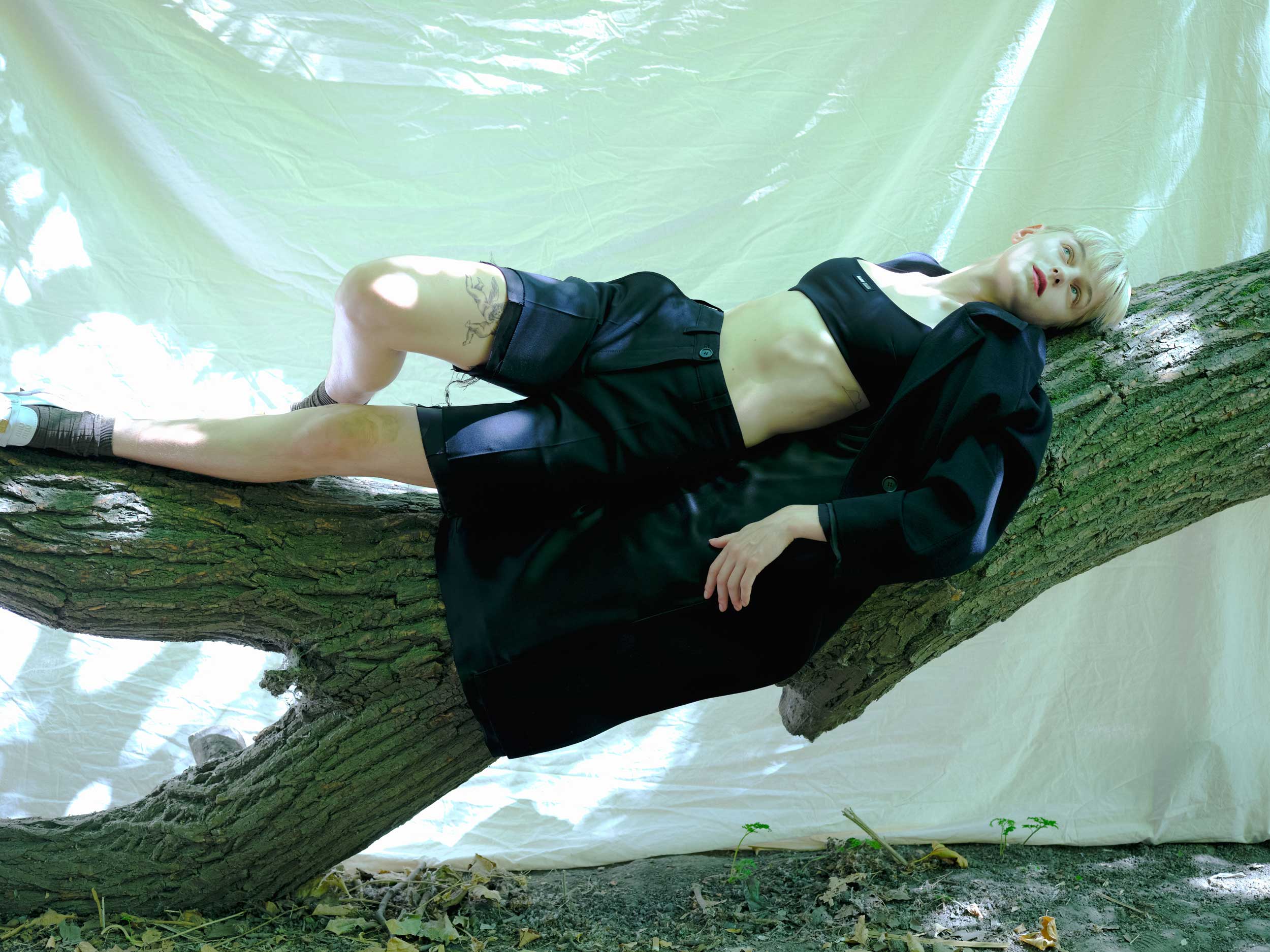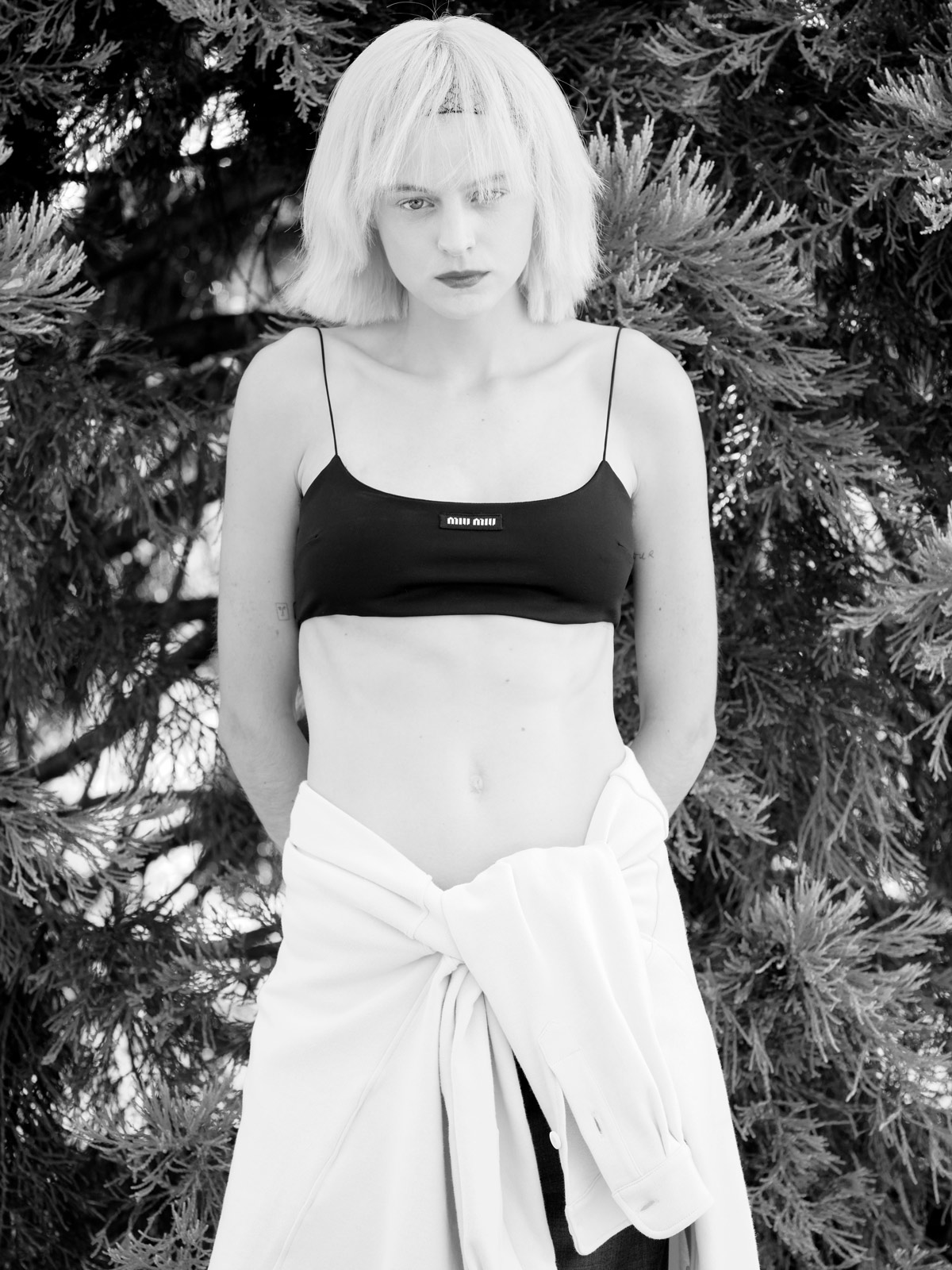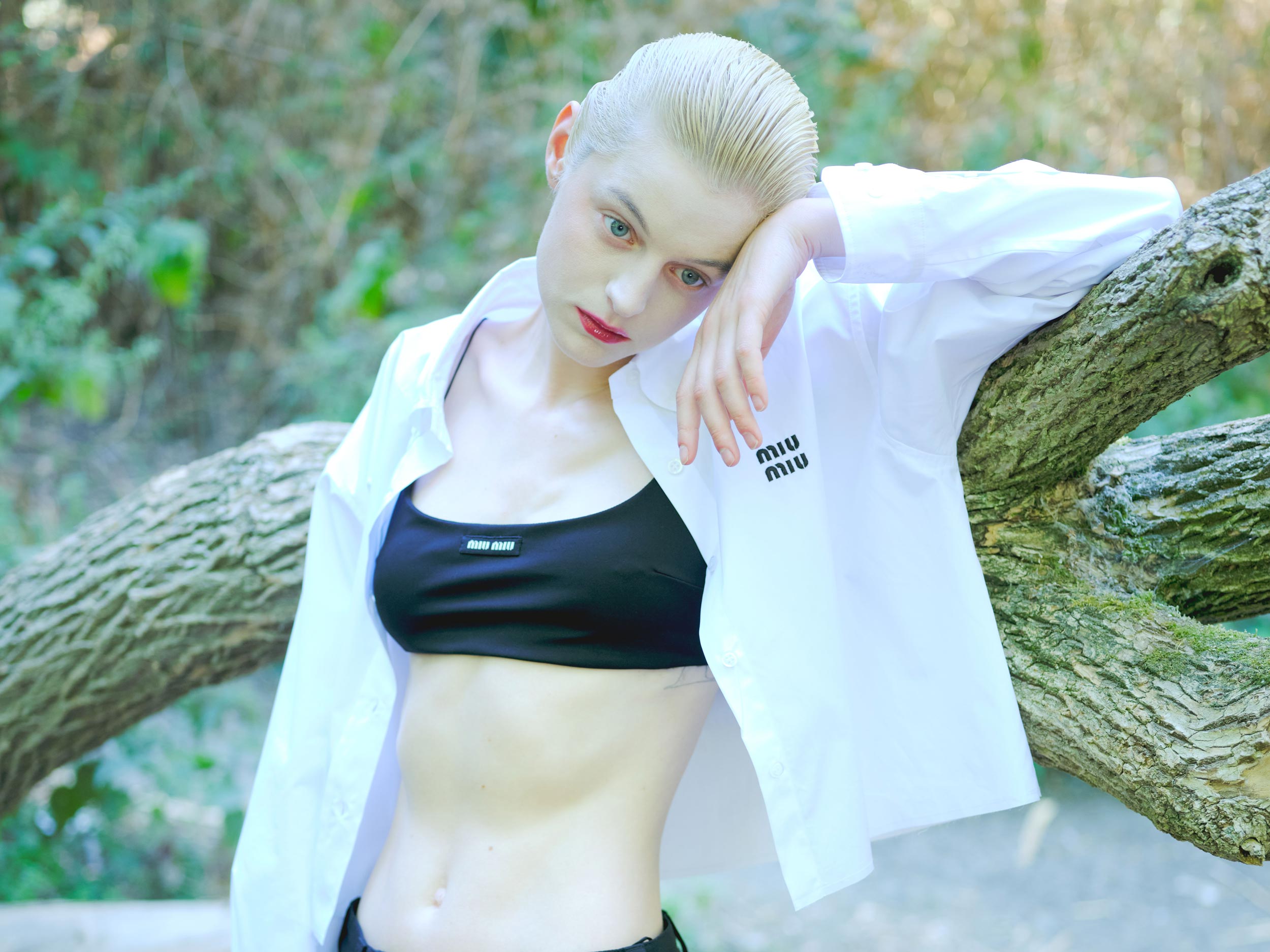
For Document’s Winter/Resort 2023 issue, the rising star speaks to film’s capacity for turning speculative freedoms into reality
There is a recurring series of photographs on Emma Corrin’s Instagram about “store testers”—that is, the scraps of left-behind paper where customers try out colorful pens in stationery shops. In one image they shared in August, a stranger had sketched a plot of toadstools and a heavily lashed, blinking eye. In others, people scrawled messages of encouragement and validation, confessed crushes and heartbreak, copied out poems and secrets, and left responses to one another. In thin brown ink, one contributor wrote: “My name is Rose, and I like having lesbian sex,” to which someone—in blue, chunkier pen—added, “I don’t like having sex very much.” Someone drew an arrow, then, to where another participant asked, “Do I? Asexuality…” On the last slide of the same post, there is only one word, written in bold, crimson script: dream. With these posts, Corrin points out a web of unlikely connections among anonymous people—thinking together, forming an archive of stories that beg to be told, folding us into a space of shared fantasy.
“I really lived in my imagination as a kid,” Corrin recalls over Zoom one Wednesday in October, just as the day is ending. Silver-gray skies assemble above London from the bay window behind their shoulder, and it seems like the right kind of atmosphere for dreaming—a familiar inclination. “It was a massive place of escape for me; I was constantly writing, creating characters, forcing my brothers to choreograph dances and be in plays that I had written. Stories—it was all stories.” Corrin’s work as an actor mines that same impulse for character-driven world-building. After a childhood in Kent, they earned a degree from Cambridge University and began auditioning for the screen, landing the high-pressure role of Diana Spencer in season four of The Crown—a performance for which they won both a Critics’ Choice and Golden Globe award.
Today, Corrin is “reluctant to admit” that life has changed much at all; they’ve lived in the same flat with the same friends for more than six years. And tonight, they will unwind from a day of theater rehearsals in the West End by preparing a traybake for the house, though they concede that their cooking skills are less than exceptional. “I’m so bad at it, but it doesn’t stop me from trying,” they laugh. “I was texting my flatmate today, like, ‘What do you want me to cook for dinner?’ And she was like, ‘Please don’t cook anything.’” For now, Corrin perches in front of the camera with one leg folded up, their chin propped on their knee as one hand grazes their crop of downy blonde hair. They glance about the room for their dog, Spencer (no affiliation to the People’s Princess), who is snoring off-camera—dreaming, too, perhaps, of some leftover traybake.
Corrin is in early phases of rehearsals for Orlando, adapted from Virginia Woolf’s groundbreaking novel featuring gender subversion and time travel. The play is directed by Michael Grandage, with whom Corrin also worked on My Policeman, a film about a queer 1950s love triangle which premiered earlier this fall at TIFF. The pair realized an exceptional creative bond, which, as Grandage says, led to them actively seeking out new ways of working together. “I respond to Emma’s clear, focused work ethic and their inquiring mind,” Grandage expresses over email. “They are highly intelligent and love text (which is a great starting point as far as I’m concerned).”
“I really lived in my imagination as a kid. It was a massive place of escape for me; I was constantly writing, creating characters, forcing my brothers to choreograph dances and be in plays that I had written. Stories—it was all stories.”
Corrin first encountered Woolf’s Orlando as a teenager, and so their relationship to the novel has unfolded against many shifting backdrops. “That book has a sense of unbridled, uncensored self-discovery. It’s so fierce and so genuine,” they tell me. First published in 1928, the novel was conceived as a prolonged love letter from Woolf to Vita Sackville-West, at the height of the couple’s affair. It spans over 300 years of British history, during which the protagonist lives both as Lord Orlando, a man, and Lady Orlando, a woman. Orlando is many things: a queer love story, a subversion of normative gender identity, an exploration of the fluidity of time, among others. On-stage, the titular role has been played by acclaimed actors like Isabelle Huppert and Miranda Richardson, though it is perhaps most closely associated with Tilda Swinton, who starred in Sally Potter’s iconic 1992 rendition. Thirty years following Swinton’s famed performance, Corrin will be the first non-binary actor to take on the role, bringing new relevance to one of the earliest gender nonconforming characters in English literature.
Reading has undoubtedly played an active role in Corrin’s ever-evolving understanding of selfhood; I ask about their affinity for the work of writer and gender theorist Paul B. Preciado, author of the auto-theoretical opus An Apartment on Uranus, for which Corrin has a commemorative tattoo. “I found [his books] at the birth of my own queer identity, I suppose, almost coincidentally. It was huge for me—the way [Preciado] talks about the feeling of otherness as a queer person, and having to carve out one’s identity against all odds. Against all the systems that enforce a binary or heterosexual existence here on Earth… I felt really seen.” They also revisit Preciado’s 2008 Testo Junkie, an exploration of the ways in which institutions like the pharmaceutical empire enforce strict limitations on gender expression and embodiment.
On-screen, Corrin’s had space to explore the politics of sexuality and gender in two new films. In a Netflix adaptation of Lady Chatterley’s Lover, they play Connie, an upper-class English woman who trades a stifling marriage for a heady love affair with her gardener, challenging conventions of gender, class, and sexual propriety in the process. In My Policeman, their character Marion is initially shocked to discover her husband Tom’s queerness, but later helps him to heal and take a stab at a second chance for happiness. Both stories thematize the fight against social conformity, and celebrate forces, passions, and ways of being in the world that are in excess of the world itself.
As great films do, Lady Chatterley’s Lover and My Policeman encourage us to imagine otherwise—to dream about small slivers of the extraordinary found in breaking from the status quo. Both films consider historical systems that have enforced heteronormativity and patriarchy, examining how identity, relationships, and even the imagination can become domesticated—or, alternatively, cracked open and subverted. “That’s what drew me to Chatterley,” Corrin explains. “Connie’s journey is breaking out of [a pattern], and discovering a sexuality that differs from the normative routes women take. I thought that was really inspiring. Sexuality as a journey, in itself, is [an idea] that is often overlooked in cinema.” In pursuit of her affair, Chatterley’s Connie is not only transgressing the laws of marriage, but also those of the British class system—a hierarchy that the film paints as a constitutive site of divisiveness and restraint.
“The greatest challenges were also the greatest pleasures. I knew the film would require [that I let go] of inhibitions and explore my own identity and body.”
In Grandage’s My Policeman, Corrin’s performance takes a different register, as Marion remains wedded to social conventions, even when they are evidently harmful to the people she loves. As such, Marion and Connie were very stimulating characters to play side by side: “I kind of wish that Marion could have some of Connie’s journey, and some of her fearlessness,” Corrin says. While Marion eventually comes around and atones for her actions, her complicity in the violence of the homophobic legal system—which separates Tom from his lover, Patrick—begets severe damage. “It was really interesting to do My Policeman, and to learn more about what life was like for gay people in the ’50s, especially given that they weren’t long ago.” They were reminded of how uncertain the state of the world remains for queer people in the political present; there is a febrile, knife-edge quality to these films—and although both are set in the past, the boundaries that they rupture continuously threaten to regenerate today.
Working on both projects, then, required a vulnerability and nerve that underlie most of Corrin’s decisions as an actor. “I’m quite restless, and I look for stuff that is going to take me out of my comfort zone,” they say. “I’m curious, and I think that’s where you learn the most.”
Especially with Chatterley, Corrin sensed that there was a great deal of self-discovery involved in the role. “The greatest challenges were also the greatest pleasures. I knew the film would require [that I let go] of inhibitions and explore my own identity and body.” They describe a central scene, in which Connie runs from the ramshackle cottage where she meets her lover and into a flash storm, stripping off her fine clothes and dancing, naked, under the rain. Corrin characterizes this scene as one of the most terrifying to film, but also one of the most fun things they’d done—“in life, not just on-screen.” There was no “movie magic,” no way of enhancing or faking such an unvarnished act. “It was incredibly liberating, and it really helped that we [filmed] it at the beginning of our shoot. It instilled in us the sense of freedom these two people were chasing—and that really is the heart and soul of the whole film.”
Throughout our conversation, I am reminded that, during the same period in which Woolf wrote Orlando, she was also working on her experimental masterpiece The Waves—a novel famed for its strange, lyrical, and promiscuous folding-together of bodies, identities, and spaces. Woolf writes: “I feel a thousand capacities spring up in me […] I am rooted, but I flow.” This synthesis of oppositions feels pertinent to Corrin’s sensibilities in many ways—mostly in the sense that they will bravely venture out to sea, but also take pleasure in dropping an anchor, every so often.
I am struck, for instance, by their composure—their calm and gracious disposition. Corrin is often compared to Swinton or a young Jodie Foster, bearing the poise and artiness of the former, and the sincerity and concentration of the latter. They also bring to mind Ben Whishaw’s sensitive intelligence; on-screen, they emit an assured, incandescent presence that mines subtleties and is grounded in copious research and thought. As Grandage recounts, “It’s great to see what choices they will make, and even more exciting to see them continue to develop those choices. Nothing is ever settled until the final moment of commitment, and that’s very inspiring for anyone who comes into their orbit. They have an enormous ability to make text sound totally natural—it is absorbed, understood, and then fed back to us as if it is entirely improvisational. That’s a real gift.”
“I think a big challenge for actors, especially if you’ve come from the stage, is [becoming] comfortable with your stillness on-screen.”
Early on with The Crown, Corrin learned the gravity of doing less. “I think a big challenge for actors, especially if you’ve come from the stage, is [becoming] comfortable with your stillness on-screen,” they say. In one of the season’s later episodes, Corrin had to gaze out a window; they were having difficulty getting the take right, when director Jessica Hobbs suggested simply doing nothing: “And so I did nothing, and she played it back for me, and I was like, Whoa. It’s about trusting that your presence can do the work for you. I think there’s something really beautiful in stillness, and I’d love to play with that more.”
It can be hard to find stillness, however, in the midst of a career that has taken off with such great velocity. This is the first time in about a year that Corrin has come home to London without needing to immediately pack a suitcase to leave again. They describe the restorative pleasures of nesting—of their favorite coffee shop, of old friendships. They look forward to a weekly ritual with their flatmates known as “Saturday Toms,” an event that begins with a trip to the market for tomatoes, which are later stewed in a pan with oil and vinegar, before finally being served on toast. “They’re amazing,” Corrin pronounces.
I ask what makes them feel most proud when they reflect on their career thus far, and they cannot immediately answer; later, however, they return to the rain scene from Chatterley as a sort of crucible for all of the ways in which they have grown. “Risk-taking is what I’m most proud of,” they say. “Especially in Chatterley, because [that took] a lot of vulnerability—both emotional and physical. It was a lot to negotiate as an actor, and as myself. To find a way to put myself in a vulnerable position, to tell a powerful story—that is what I feel proud of.” Grandage weighs in, explaining that Corrin “has an enquiring mind and an open spirit, and is a genuinely kind person. When I see success coming their way, it makes me enormously proud, because I think there is some kind of justice in the world—it couldn’t happen to a more deserving individual.”
Looking to the months ahead, Corrin is eager for Orlando to begin—“the West End at Christmas!” they gush. But they are also already dreaming about what new challenges lie ahead. For the past three years, Corrin and their friend Avi have been writing a film, based on an article to which they bought the adaptation rights. Finally, after seven drafts, they have a provisionary version to put into development. “We saw our producing partners over the weekend, and were laughing about how much our script has changed since we sent the first draft to them last year,” they say. “It’s so drastic that we were asking, ‘What did you see in it, the first time [around]?’” They enthuse for several minutes about the pleasures and challenges of screenwriting and collaboration, with all its intensive revision and planning. All the while, their face glows with renewed energy. It is difficult not to share in their anticipation.
Corrin’s career seems built upon this scaffolding of dreams, from childhood play, to films that speculate on freedom and the laws of identity, to now: telling their own stories. I think about how the word ‘queer’ originally referred to the oblique, bent, or angular, thus understood by many queer thinkers as a refusal of normativity—as a shape to gather under that gestures outward and elsewhere. Corrin, too, has dreamt of these alternative possibilities; now, they are forming them into reality.
Lady Chatterley’s Lover is out in cinemas across the UK, and will be available to stream on Netflix.
Hair Franziska Presche at Together. Make-Up Ana Takahashi at Streeters. Set Design Phoebe Shakespeare at Saint Luke. Photo Assistants Tommy Francis, Okus Milsom. Styling Assistants Lauren Coppen, Olivia Rozalia Filipek, Rebecca Daly. Make-Up Assistant Chloe Palmer. Set Assistant Emily Avery. Production un/produced. Executive Producer Rosie Donoghue. Producer Amelia Elsworth Smith. Production Assistant Rosie Meyer. Production Director Madeleine Kiersztan. Talent Director Tom Macklin.






































